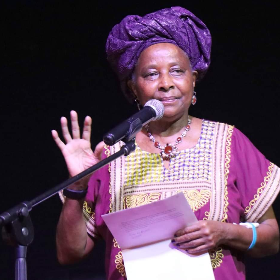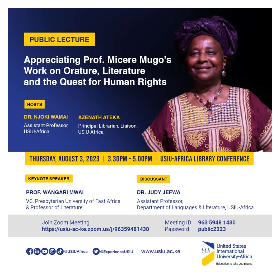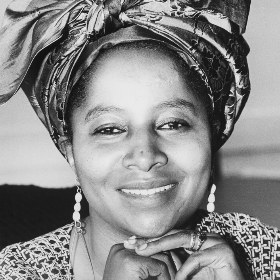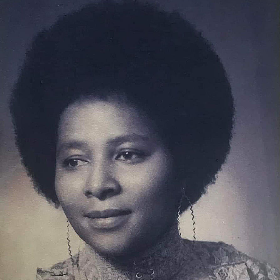
Joyce Wangari told a story
The Annual Lecture 2022 at the British Institute of Eastern Africa (BIEA) Nairobi hosted Prof M?cere virtually. It was very well attended with an overflowing Zoom room.
*Listen up to her wisdom in this live recording graciously availed by BIEA*
https://www.dropbox.com/s/ofb0frjrall722x/BIEA%20Nairobi%20Annual%20Lecture%20by%20Prof%20Micere%2017th%20Feb%2022.mp3?dl=0
BIEA Nairobi Annual Lecture
Registration: biea.ac.uk/welcome/to/annual_lecture
M?cere G?thae M?go, Emeritus Meredith Professor for Teaching Excellence; past Chair of the Department of African American Studies; past Director of the Africa Initiative and past Director of Graduate Studies in AAS at SU, is a poet, playwright and literary critic who has published 7 books, 8 co-edited supplementary school readers, 3 monographs and edited the journal, Third World in Perspective. Her works include: Illuminations on Chinua Achebe: the Art of Resistance (Essay Collection with Ruffin); Writing and Speaking from the Heart of my Mind (selected essays and speeches); Art, Artists and the Flowering of Pan-Africana Liberated Zones (monograph); My Mother’s Poem and Other Songs (poetry); The Long Illness of Ex-Chief Kiti (play); Daughter of My People, Sing! (poetry); Visions of Africa (literary criticism); African Orature and Human Rights (monograph); Gik?y?, Shona and Ndebele Ethics and Aesthetics (monograph); M?thoni wa K?r?ma–Mau Mau Woman Field Marshal: Interrogating Silencing, Erasure and Manipulation of Female Combatants’ Texts (monograph) and The Trial of Dedan Kimathi (play, co-authored with Ng?g? wa Thiong’o). Professor M?go has many firsts including: being the first student in segregated colonial Kenya to be admitted into an all-white school, Limuru Girls’ High (in 1960); the first person (male or female) in East Africa to receive a doctorate in Literature (in 1973) and the first woman to be elected Dean of Arts (comprising of the arts, humanities and social sciences) at the University of Nairobi (in 1978). M?cere is a recipient of numerous honors, including: a forthcoming documentary on her life and work, Making Life Sing in Pursuit of Utu by Professor D.W. Wachanga, University of Wisconsin; the Lifetime Achievement Award in African Literature by Africa Writes, Royal African Society, London; Honorary Doctor of Letters, University of Nairobi; the Flora Nwapa Award for excellence in writing; Distinguished Mwalimu Julius Nyerere Award from the University of Dar es Salaam; the Nelson Mandela Leadership Award; College of Arts and Sciences Award for Excellence in Master Level Teaching and Distinguished Africanist Award from the New York African Studies Association for her contribution to scholarship. At the Kenya 50th jubilee in December 2013, M?cere was awarded the Elder of the Burning Spear and in November 2002, The East African Standard Century had listed her among “The Top 100: They Influenced Kenya Most During the 20th Century.” M?cere is also a member of numerous organizations and serves on many committees, advisory and executive boards and directorships – locally as well as internationally. She is the founder of the United Women of Africa Organization; a co-founder of the Pan African Society of Central New York and its current President; and a member of the Ghana Society of Central New York. A committed community activist, M?cere is a passionate advocate for human rights especially as they have been historically denied to marginalized groups. She describes her daughters, M?mbi and the late Njeri, as her best friends and comrades in struggles for social justice.
Professor Muhonja is a brilliant researcher, academician and intellectual, whose scholarship includes an analysis of my theorization on utu, orature and feminism.
DATE
Feb 17 2022
Expired!
TIME Free & Open to all!
7:00 pm - 9:15 pm
© 2023 BIEA.
July 24, 2023 08:45 PM

Joyce Wangari told a story
https://biea.ac.uk/decolonizing-african-scholarship-2022-annual-lecture-review/
Decolonizing African Scholarship by Prof Micere Githae Mugo: Review of BIEA’s 2022 Annual Lecture
By BIEAMarch 4, 2022
Home » Decolonizing African Scholarship by Prof Micere Githae Mugo: Review of BIEA’s 2022 Annual Lecture
by Sharon A. Otieno & Aaliyah O. Ibrahim
This year’s BIEA annual lecture was graced by the indefatigable presence of Prof. Micere Githae Mugo, a distinguished professor, playwright, poet, author, activist, and literary critic from Kenya. Held online via zoom, the attendance of over a hundred participants from around Africa and the world reflected both the influence of Prof. Mugo’s scholarship as well as public anticipation of this gathering after its postponement in 2020. The lecture, aptly titled “Decolonizing Scholarship: Excavating Indigenous Sites of Knowledge, Using utu as a Theoretical Framework,” aligned with the contemporary yet longstanding call for African scholars to move beyond colonial paradigms towards critical considerations for utu as a scholarly practice.
For Prof. Mugo, utu or ubuntu means the essence of what it is to be human. Utu, she lectured, is what or rather how we assert our humanity and affirm the humanity of others. Prof. Mugo modeled utu right at the onset of her lecture as participants were encouraged to engage in an oratory practice of call and response. The call of “Hodi Hodi”, or “Can I enter?” marked the beginning of a lecture interspersed with check-in questions of “How are we doing?” These questions and invitations from Prof. Mugo gave the audience time to respond and digest several intellectual promptings but even more notably, the direct engagement with her audience reflected Prof. Mugo’s assertion of a shared experience of humanity as utu.
It was within this shared experience of humanity that Prof. Mugo called on scholars to excavate “burial sites of indigenous knowledge” with urgency, creativity, and a bearing sense of invention. According to Prof. Mugo, these burial sites symbolize forgotten sources of knowledge that were violently replaced by the colonial education system. Pointing to practices of indigenous knowledge such as orature, literature, and film, Prof. Mugo comprehensively defined indigenous knowledge as an educational content that embodies ways of knowing, understanding, and learning which require skills rooted in specific and special rotations evolved within a contextualized cultural locale. To the professor, educational content and skills instilled through formal and informal schooling is culturally unique to each place of origin and require preservation.
Recognizing that colonial “domination has attempted to exterminate indigenous knowledge,” claiming it as harmful and “antithetical to human development,” Prof. Mugo emphasized how “scholars should accelerate their effort in negating these neocolonial and demonized sites of knowledge.” Of particular interest to the professor is the role of African institutions which have taken part in excavating burial sites of indigenous knowledge. From universities and schools such as the University of Nairobi’s Department of Literature to organizations like CODESRIA, among many others, Prof. Mugo pointed out how urgently the humanities and social sciences have taken up decolonizing scholarship through new theoretical frameworks. She further challenged participants to develop analytical frames, paradigms, and methods to excavate and analyze data from indigenous sites of knowledge, stating that “it is one thing to have colonial occupiers…destroy our sites of knowledge and another for us to do it ourselves.”
Tracing the history of the quest for indigenous knowledge, Prof. Mugo drew examples from the figure of Olaudah Equiano, an enslaved person whose nostalgic descriptions of the beauty of Igbo culture, specifically, orature, was centered in his 1789 autobiography, The Interesting Narrative of the Life of Olaudah Equiano. For Prof. Mugo, these were early attempts to excavate, document, and remember indigenous knowledge from people who had utu.
From FESTAC 77, a historic gathering of artists in 1977 Nigeria, to plays like Betrayal in the City by Francis Imbuga and Trials of Dedan Kimathi by Ngugi wa Thiong’o and Micere Githae Mugo, the professor herself, the lecture recognized how artistic interventions to excavate indigenous knowledge have created a long history that direct us to deconstruct and rebuild these sites of knowledge. Further noting the contributions of writers like Tsitsi Dangarembga, author of bestselling novel Nervous Conditions, and Ousman Sembène, writer and film director of the classic Xala, Prof. Mugo explicitly invited listeners to think of how African artists have done African orature “in a critical way and in a corrective way.”
Ultimately, the powerful and thought-provoking lecture was a call to action. Prof. Micere Mugo urged African scholars to promote and excavate sites of indigenous knowledge especially in curriculums to truly join in the chorus of decolonization. As in the excerpt of the poem below from her collection which she recited to participants, utu in the light of her lecture is a principle that asks us to collectively remember and make a song of decolonial freedom.
what do you remember?
sing
i have forgotten
my mother’s song
my children
my children will never know
this i remember
mother always said
sing child sing
make a song
Sharon Adhiambo Otieno recently graduated with an MSc. in Cultural Anthropology and Development Studies from Catholic University of Leuven (Belgium). She also obtained a B.A. in Anthropology from the University of Nairobi (Kenya). Her research interests include the intersection between livelihoods, health and environment, disability, and gender. Sharon’s current research project at the BIEA focuses on Deaf identities and culture in Nairobi. You can reach her at sharonotieno22@gmail.com
Aaliyah O. Ibrahim is an independent social researcher and community educator with academic interests in health equity and human rights. Within the health field, she is especially passionate about community health programs and women’s health in Africa. She ethnographically explores the nexus of health, development, and culture with a primary focus on Nigeria and Uganda. She is currently researching mental health landscapes for African women and the implications of related mental health cultures and policies.
Previous Post
Anthropology And The African Postcolony: A Roaming Conversation Between Graduate Attachés
Next Post
Remote Sensing For Biocultural Heritage Preservation In An African Semi-Arid Region: A Case Study Of Indigenous Wells In Northern Kenya And Southern Ethiopia.
© 2023 BIEA.
July 24, 2023 08:26 PM























